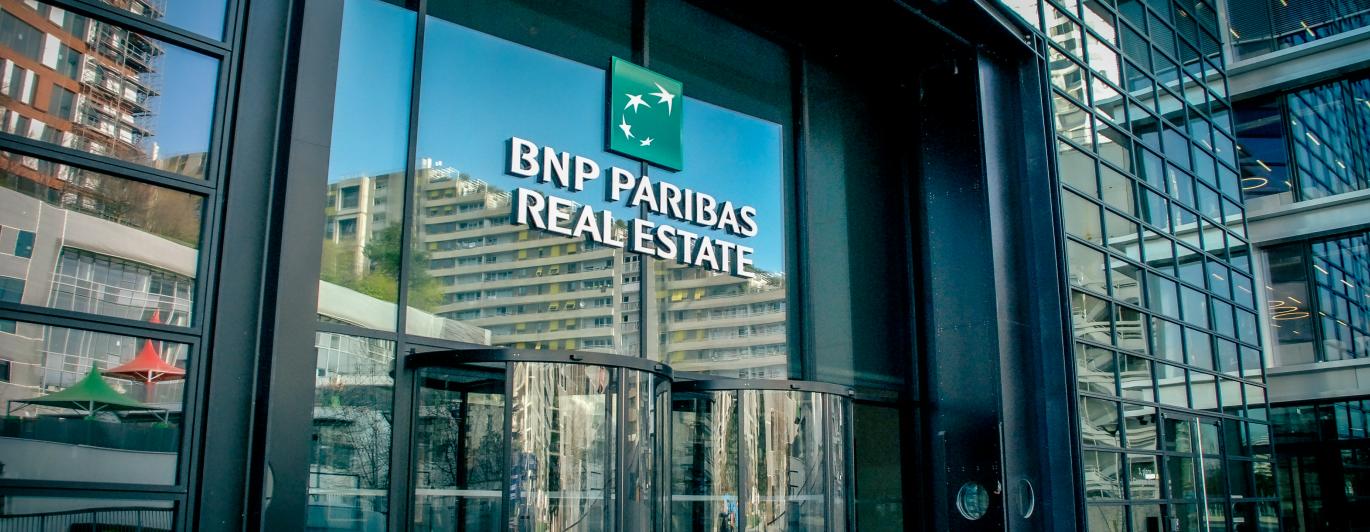Une SCPI (Société Civile de Placement Immobilier) est une solution vous permettant d’investir dans un patrimoine immobilier, en contrepartie de revenus locatifs réguliers.
Je découvre les SCPI
Investir dans l’immobilier selon vos objectifs patrimoniaux
Depuis plus de 60 ans, BNP Paribas Real Estate Investment Management (REIM) offre aux investisseurs la possibilité d'investir dans l'immobilier non coté en Europe. BNP Paribas REIM possède une large gamme de solutions d’investissement couvrant tous les secteurs de l’immobilier afin de répondre aux besoins des clients.

Une SCPI (Société Civile de Placement Immobilier) est une solution vous permettant d’investir dans un patrimoine immobilier, en contrepartie de revenus locatifs réguliers.
Je découvre les SCPI
Un OPCI (Organisme de Placement Collectif Immobilier) Grand Public est un produit d’épargne qui détient plusieurs types d’actifs : immeubles physiques et titres financiers. Sa caractéristique : permettre de réaliser un investissement dans l’immobilier tout en laissant les actionnaires libres de retirer leur épargne.
Je découvre l'OPCI
Une SC (Société Civile) est un produit d’épargne qui vous permet d’investir indirectement dans l’immobilier, et qui peut être souscrit sous forme d’unités de compte au sein de votre contrat d’assurance-vie, de capitalisation ou d’épargne-retraite.
Je découvre la SC
Une stratégie de long-terme qui saisit les opportunités du nouveau cycle immobilier.
20,00 €
prix de souscription1
-
Art. 8
règlement SFDR5
-
Une diversité des typologies et de localisations en Europe pour une meilleure répartition des risques.
93,31€
valeur liquidative9
2/7
niveau de risque (SRI PRIIPS)10
0%
commission de souscription acquise au fonds11
Art. 8
règlement SFDR12
L'accès au logement favorisé par une épargne porteuse de sens.
106,33€
valeur liquidative5
5 à 5,5%
performance cible 13
2/7
niveau de risque (SRI PRIIPS)6
Art. 8
Règlement SFDR14
1, 5, 6, 9, 10, 11, 12, 13 et 14 Définitions de Prix de souscription , Règlement SFDR , Niveau de risque (SRI PRIIPS) , Valeur liquidative , Niveau de risque (SRI PRIIPS) , Commission de souscription, Règlement SFDR , Performance cible et Règlement SFDR
1. Prix de souscription : En euros par part.
5. Règlement SFDR : La SCPI relève de l’article 8 du Règlement (UE) 2019/2088 dit SFDR (Sustainable Financial Disclosure) du 27 novembre 2019 sur les informations à fournir en matière de développement durable dans le secteur des services financiers.
6. Niveau de risque (SRI PRIIPS) : L'indicateur synthétique de risque et de rendement : chiffre de 1 à 7 (du risque le plus faible au risque le plus élevé). De façon générale, les placements ayant le plus fort potentiel de performance sont également les plus risqués. Plus le risque est élevé, plus l'horizon d'investissement recommandé est long. L'indicateur synthétique de risque est fondé sur la volatilité historique du portefeuille au cours des 5 dernières années.
9. Valeur liquidative : En euros par action.
10. Niveau de risque (SRI PRIIPS) : L'indicateur synthétique de risque et de rendement : chiffre de 1 à 7 (du risque le plus faible au risque le plus élevé). De façon générale, les placements ayant le plus fort potentiel de performance sont également les plus risqués. Plus le risque est élevé, plus l'horizon d'investissement recommandé est long. L'indicateur synthétique de risque est fondé sur la volatilité historique du portefeuille au cours des 5 dernières années.
11. Commission de souscription: Depuis le 15/07/2024, suspension temporaire des commissions de souscription acquises au fonds.
12. Règlement SFDR : L’OPCI relève de l’article 8 du Règlement (UE) 2019/2088 dit SFDR (Sustainable Financial Disclosure) du 27 novembre 2019 sur les informations à fournir en matière de développement durable dans le secteur des services financiers.
13. Performance cible : Performance nette de frais comprise sur une période de détention de 10 ans minimum.
14. Règlement SFDR : La SC relève de l’article 9 du Règlement (UE) 2019/2088 dit SFDR (Sustainable Financial Disclosure) du 27 novembre 2019 sur les informations à fournir en matière de développement durable dans le secteur des services financiers.
Une Société Civile de Placement Immobilier (SCPI) est une société qui détient de l’immobilier pour le louer. Les objectifs de cet investissement sont l'acquisition et la gestion d’un patrimoine immobilier locatif (à usage commercial ou d’habitation). Par nature, la SCPI détient essentiellement...
Voir plusLes principaux indicateurs de performance des SCPI sont :• Le taux de rendement interne (TRI) à 5 ou 10 ans,• Le taux de distribution brut (pour rappel, jusqu'au 31/12/2021, les sociétés de gestion utilisaient le DVM),• Le rendement global immobilier (qui additionne le taux de d...
Voir plusCes deux fonds n’ont pas le même objectif, mais peuvent être complémentaires.La SCPI est un « pur » fonds immobilier, dont l’objet est de gérer un parc immobilier à usage locatif. Celui-ci reverse des loyers nets de charges et de frai...
Voir plusLes SCPI, OPCI et Autre FIA sous forme de SC (société civile) sont des supports d’investissement à vocation immobilière non coté. La SCPI (Société Civile en Placement Immobilier) est une structure hybride, à la fois société civile immobilière et fonds d’investissement alternatif (FIA) au s...
Voir plusRetrouvez toutes nos explications sur l’investissement immobilier ici :
Nos convictions environnementales et sociales
Avec pour ambition de contribuer au développement d’une ville plus durable, et proposer à ses clients et partenaires des produits et services immobiliers toujours plus responsables, BNP Paribas REIM s’est fixé une feuille de route ESG renforcée pour atteindre 3 objectifs d’ici 2025 :


BNP Paribas REIM franchit une nouvelle étape clé pour son fonds HPF Europe (Healthcare Property Fund Europe) avec l’acquisition, ce 10 décembre 2025, d’une participation majoritaire dans un portefeuille italien emblématique d’actifs de santé.

Lors des assemblées générales annuelles des SCPI de juin 2026, des postes de membres des Conseils de Surveillance seront à pourvoir.

Lancée en avril 2025, la SCPI IMAREA PIERRE est venue compléter l’offre grand public de BNP Paribas Real Estate Investment Management France avec pour ambition une stratégie diversifiée visant à saisir des opportunités sur toutes les typologies d’actifs immobiliers en Europe et dans les principaux pays de l’OCDE. Après un premier investissement dans un parc d’activités commerciales à Bologne en Italie, la SCPI renforce son portefeuille avec deux nouvelles acquisitions : un immeuble mixte situé à Nancy et un établissement de santé à proximité de Bruxelles.